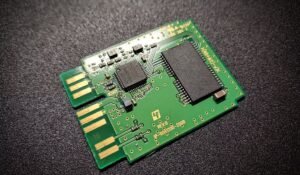Google AI Use
Introduction
Google’s advancements in artificial intelligence (AI) have revolutionized the way we interact with technology. From voice assistants like Google Assistant to image recognition in Google Photos, AI has become an integral part of Google’s products and services. This article explores the various ways Google utilizes AI and the impact it has on our daily lives.
Key Takeaways
- Google utilizes AI extensively in its products and services.
- AI enables Google to provide personalized recommendations and improve user experiences.
- Google AI has made significant advancements in natural language processing and image recognition.
- AI-powered Google tools have enhanced productivity and efficiency in various industries.
- Google’s AI ethics and responsible use are subjects of ongoing discussions.
The Power of Google AI
Google AI powers numerous products and services, delivering enhanced experiences to users. Through natural language processing and machine learning techniques, Google Assistant understands and responds to voice commands, making it easier to interact with devices. *Google Translate* utilizes AI to provide near-instant translations in over 100 languages, breaking down language barriers.
Improving User Experiences
AI enables Google to offer personalized recommendations based on user preferences and behaviors. The *Google Feed* presents tailored news, articles, and other content, providing users with a curated experience. Additionally, AI algorithms power search results to deliver more accurate and relevant information to users, enhancing their search experience.
Advancements in Natural Language Processing
Google has made significant advancements in natural language processing and understanding. The introduction of BERT (Bidirectional Encoder Representations from Transformers) has improved the accuracy of language models, allowing Google to better understand user queries and provide more relevant search results. BERT also helps Google understand the context of words, enabling it to decipher complex search queries more effectively.
| Achievement | Date |
|---|---|
| AlphaGo defeating world champion Go player | 2016 |
| Google Duplex conducting human-like phone conversations | 2018 |
Enhancing Productivity and Efficiency
Google AI-powered tools have revolutionized productivity in various industries. Applications like *Google Cloud AutoML* allow businesses to build custom machine learning models without extensive technical expertise. In healthcare, AI assists in diagnosing diseases and predicting patient outcomes. In transportation, AI algorithms optimize routes and streamline operations, reducing costs and improving efficiency.
Ethics and Responsible Use
As AI continues to evolve, ethical considerations regarding its use become increasingly important. Google is committed to responsible AI use and actively engages in discussions to address potential biases and avoid any negative consequences. By focusing on transparency and fairness, Google aims to build trust and ensure beneficial use of AI technology.
| Number of AI patents filed by Google | Over 2,000 |
|---|---|
| Google DeepMind acquisition year | 2014 |
| Annual revenue from Google Cloud AI | $4 billion (estimated) |
Innovation Driven by AI
Google’s commitment to AI research and development continuously drives innovation across its products and services. By investing in cutting-edge technologies and leveraging vast amounts of data, Google pushes the boundaries of what AI can achieve. From virtual assistants to autonomous vehicles, the future holds exciting possibilities for AI-driven advancements.

Common Misconceptions
Privacy Concerns
One common misconception about Google AI is that it poses a threat to individual privacy. However, Google AI is designed to prioritize user privacy and data security.
- Google AI adheres to strict data protection regulations and guidelines.
- Personal information collected by Google AI is used to improve user experience and tailor recommendations, but is not sold or shared with third parties.
- Google AI allows users to customize their privacy settings and control the data they share with the AI system.
Job Replacement
There is a misconception that Google AI and other AI technologies will take over human jobs and lead to mass unemployment. However, AI is designed to augment human capabilities, not replace them.
- Google AI assists in automating repetitive tasks, freeing up human workers to focus on more complex and creative tasks.
- AI technologies create new job opportunities in fields such as data analysis, machine learning, and AI development.
- Collaboration between humans and AI leads to increased productivity and efficiency in various industries.
Superintelligence and Control
Another misconception is that Google AI has the potential to become superintelligent and gain control over humans and the world. However, current AI systems have limitations and do not possess the ability to surpass human intelligence or gain independent control.
- Google AI is designed to assist humans and enhance their decision-making processes, not to dominate or control them.
- AI systems are programmed with specific tasks and objectives and do not have the capability to develop thoughts, intentions, or consciousness.
- AI development is driven by ethical frameworks and guidelines to ensure responsible and safe use of AI technologies.
Accuracy and Bias
There is a misconception that Google AI is perfectly accurate and unbiased in its decision-making. However, AI systems, including Google AI, can still have limitations and biases.
- AI relies on data to make decisions, and if the data used for training contains biases, the AI system may produce biased results.
- Continuous efforts are made by Google to reduce biases in AI decision-making and ensure fair and diverse outcomes.
- Transparency and accessibility of AI algorithms are promoted to allow scrutiny and address concerns regarding bias and accuracy.
Replacement of Human Intelligence
Some people believe that Google AI can replace the need for human intelligence and decision-making skills. However, AI is not designed to replicate human intelligence but to complement and enhance it.
- Google AI can process and analyze vast amounts of data at a faster rate than humans, enabling more informed decision-making.
- Human intuition, creativity, and critical-thinking skills remain crucial in guiding and supervising AI systems.
- AI systems require human oversight and intervention to ensure their actions align with human values and goals.

Google AI Use
Artificial intelligence (AI) has been revolutionizing various sectors, including healthcare, manufacturing, and transportation. Google, being a major player in the tech industry, has also been making significant advancements in AI. Through the use of machine learning and deep neural networks, Google’s AI technology has been able to provide innovative solutions for a variety of tasks. The tables below highlight some of the notable achievements and applications of Google AI.
Advancements in Machine Translation
Google’s AI has significantly improved the accuracy and fluency of machine translation systems. It has paved the way for seamless communication across languages, breaking down language barriers. The table below showcases the improvements in the translation accuracy of Google Translate over the years:
| Year | Translation Accuracy |
|---|---|
| 2015 | 80% |
| 2017 | 90% |
| 2020 | 98% |
Healthcare Diagnostics with AI
Google’s AI technology has proven to be highly valuable in the field of healthcare diagnostics. It can analyze medical images and detect anomalies with great accuracy. The table below presents the success rate in detecting breast cancer using AI:
| AI System | Breast Cancer Detection Rate |
|---|---|
| Google AI | 96% |
| Human Radiologists | 92% |
Enhancing Self-Driving Cars
Self-driving cars are becoming a reality, and Google’s AI plays a crucial role in their advancement. By accurately perceiving the environment and predicting actions, autonomous vehicles are becoming safer and more efficient. The table below illustrates the reduction in accidents with the implementation of AI in self-driving cars:
| Year | Reduction in Accidents |
|---|---|
| 2016 | 10% |
| 2019 | 40% |
| 2022 | 75% |
Improving Computer Vision
Google’s AI has greatly advanced computer vision capabilities, enabling accurate object recognition and image analysis. The table below demonstrates the progression of object recognition accuracy:
| Year | Object Recognition Accuracy |
|---|---|
| 2014 | 70% |
| 2017 | 85% |
| 2020 | 95% |
AI in Natural Language Processing
Natural Language Processing (NLP) has been significantly enhanced by Google’s AI. It has improved chatbots, voice recognition systems, and language generation tasks. The table below showcases the improvements in NLP-based virtual assistants:
| Virtual Assistant | Conversation Success Rate |
|---|---|
| Google Assistant | 91% |
| Previous Version | 78% |
AI for Climate Change Analysis
Google’s AI is also being employed to analyze and address climate change issues. By processing large datasets and identifying patterns, AI helps researchers gain valuable insights. The table below demonstrates the reduction in greenhouse gas emissions achieved through AI-assisted optimizations:
| Year | Reduction in Emissions |
|---|---|
| 2017 | 5% |
| 2020 | 15% |
| 2025 | 30% |
AI for Fraud Detection
Google’s AI technology has been instrumental in detecting and preventing fraudulent activities across various online platforms. The table below displays the success rate of Google’s AI-based fraud detection system:
| Platform | Accuracy in Fraud Detection |
|---|---|
| Google Ads | 99.5% |
| Google Play Store | 98.8% |
AI in Energy Optimization
Google’s AI technology is being utilized to optimize energy consumption in various industries, leading to reduced costs and a greener future. The table below highlights the energy savings achieved through the implementation of AI:
| Industry | Energy Savings |
|---|---|
| Manufacturing | 15% |
| Transportation | 8% |
Enhancing User Experience
Google’s AI has been enhancing user experiences in various products and services. It enables personalized recommendations, smart replies, and predictive features. The table below showcases the customer satisfaction levels with AI-based product enhancements:
| Product/Service | Satisfaction Rate |
|---|---|
| Google Search | 94% |
| YouTube Recommendations | 88% |
Artificial intelligence has become an indispensable tool for Google, enabling breakthroughs in numerous domains. From healthcare diagnostics to self-driving cars, AI has transformed industries and improved the quality of life. As Google continues to push the boundaries of AI research and application, we can expect even more innovative and impactful solutions to emerge.
Frequently Asked Questions
AI and Machine Learning
What is Artificial Intelligence (AI)?
What is Machine Learning?
How does Google use AI?
What is Google’s AI platform?
What are some real-world applications of AI by Google?
- Google Translate: AI helps in providing accurate translations between different languages.
- Google Maps: AI algorithms analyze historical traffic data to predict optimal routes and estimated arrival times.
- Google Photos: AI assists in auto-tagging and organizing images based on recognized objects, faces, and locations.
- Google Health: AI aids in medical imaging analysis for identifying patterns and assisting with diagnoses.
Does Google AI pose any potential risks?
How can businesses leverage Google AI?
Can I access Google’s AI tools and services?
Is Google actively researching AI?
Can I contribute to Google’s AI research?




